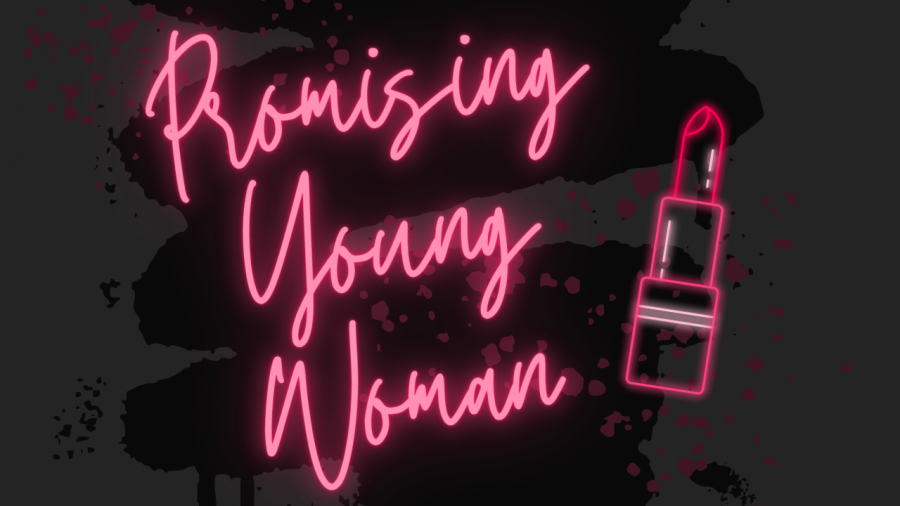Not Your Average Avenging Angel
Emerald Fennell’s “Promising Young Woman” is a standout success
Cassie may not be a perfect, or even morally good protagonist, but that won’t keep you from ruthlessly rooting for her.
January 22, 2021
It’s rare to see a film about women written by an actual woman; and far rarer for that story to be then directed by a woman. That’s why audiences were thrilled to see Emerald Fennell’s directorial debut feature film “Promising Young Woman,” a seemingly more modern “Kill Bill.”
However, Fennell doesn’t succumb to the usual tropes of the “woman’s revenge flick” cliche, instead subverting the genre into something much more dark. Make no mistake— this movie is not meant to be empowering, though its poor marketing might leave you with that impression. Instead, it’s much deeper, and darker than most directors are willing to go.
Its protagonist isn’t meant to serve as a role model. She’s just an angry, desperate woman, unafraid to destroy herself in the process of getting her revenge. Before reading any further, please be aware that both this movie and this article discuss sexual assault and the culture surrounding it.
*SPOILERS AHEAD*
The movie opens in a nightclub, with neon strobe lights and a montage of men set to Charli XCX’s “Boys.” No sooner are we then introduced to our protagonist Cassie, sprawled out across a couch, clearly intoxicated to the point of no return. A group of guys advance, two of them remarking on how easy it would be to take advantage of her, while the other (Adam Brody) scoffs at their sexist comments, and offers to call Cassie a cab and get her home safely. Once the car door opens his persona quickly shifts, now pressuring her to come up to his apartment, pouring her a full glass, and tossing her onto his bed.
This idea of nice guys not being quite what they seem continues throughout the movie, that rapists present themselves as trustworthy, even gentle. Now as the audience shutters, unprepared to watch this assault unfold, Cassie reveals her true intentions, snapping out of her drunken fog and apprehending the predator.
After a jarring shift to Cassie walking home in full daylight, the movie displays the first of many jarring shifts in tone, showing what appears to be blood dripping down Cassie’s leg before revealing that it’s just ketchup. Remember- Fennell is set on undermining our expectations, and creating something fresh, never before seen.
We then learn exactly who our protagonist is— a 30-year-old med school drop-out still living with her parents (Jennifer Coolidge and Clancy Brown), working at a quirky yet quaint coffee shop with the loveable Laverne Cox. This switch from thriving student to cynical barista is caused by a traumatizing event in college, involving her closest friend, Nina. Fennell, ever bent on keeping us guessing, leaves the details of this ordeal a secret, instead tossing the incredible Bo Burnham on screen as the delightfully funny Ryan.
This scene is straight from a cheesy rom-com, a refreshing meet-cute between the two leads to what appears to be an equally enjoyable date. However, when Ryan hints to Cassie that he would like to take her back to his place, she hardens, icily turning him down. She’s alright with men expecting more from her than she’s willing to give if she has the upper hand, but the idea of going into that sort of situation unprotected terrifies her.
After a bit of reevaluation, she accepts that Ryan isn’t the sort of guy she needs to be afraid of, and asks if he could give her a second chance in what is one of my favorite scenes in the movie. Burnham’s Ryan is charmingly awkward and full of quick wit, and injects many much needed lighthearted scenes into the film. On their second date, he pokes a bit more into their shared time at med school, asking if she’s remained close with any of their ex-classmates. She instantly shuts down, saying she’s no longer connected to anybody from their time there, and asks him the same question, to which he replies yes, and mentions the name Al Monroe (Chris Lowell). This sends Cassie into a social media stalking spiral, especially when she finds out that he’s engaged, and this is what sparks her final revenge plot into action.
Her first target in this grand scheme is an old classmate, Madison McPhee (Alison Brie), who is revealed to have blamed Nina for being assaulted. To balance the scales, Cassie sends her up to a hotel room with a strange man while Madison is in an intoxicated haze. Not only is Brie’s performance expectedly amazing, but her character is integral to the movie’s main statement— rape is a culture, perpetuated by all who choose to be bystanders. The villains are not just women or men, it’s everybody that averts their eyes or supports an abuser, everybody that excuses what should be inexcusable actions.
Cassie then moves on to Dean Walker (Connie Britton), the director of her former medical school to whom Nina’s assault was reported. This is where the details of her rape are laid out for us: she was at a dorm room party, too drunk to comprehend what was happening to her. Taking advantage of her weakened state, Monroe assaulted her in a room full of people, each of which did nothing to stop this from occurring. When Walker was informed of this event, she simply sat on the accusation, maintaining that this sort of thing is reported all the time and lives can’t be ruined due to a rumor.
In retaliation, Cassie shares that Walker’s daughter was dropped off in the same dorm as Nina with drunk male students. Walker immediately breaks down, apologizing for her ignorance, and begging for her daughter to be brought home safely. Cassie coldly replies that her threat was nothing more than a bluff, introducing us to another key fact about the character— she doesn’t punish innocents, and her torture is often completely psychological.
Avenging angel Cassie knocks on the door of her next victim, a lawyer who deals exclusively in harassing survivors into dropping cases against their assaulters, and is surprised to hear that he has been awaiting her arrival. Racked with guilt, he’s been expecting to “pay the piper,” and recalls Nina’s case from memory. This is payment enough for Cassie, who leaves his house and calls off the plan.
Veering in a completely different direction tonally, the film once again turns its attention back to Ryan and Cassie’s relationship, and we see her genuinely start to let go of her anger and mistrust. If the vulnerable and comedic love confession doesn’t pull at your heartstrings, the convenience store dancing to Paris Hilton’s greatest hits will. It’s a collection of sweet, intimate moments, with just enough of Burnham’s humorous charm peppered in to make the audience and Cassie forget that this isn’t about romance- it’s about revenge.
In an anxious fit, Madison turns up at her door, begging Cassie to tell her if anything happened between Madison and the previously mentioned man while she was drunk. Cassie swears nothing happened, once again reminding the audience that she would never subject someone to Nina’s pain in an effort to get even, but messing with their heads isn’t beyond her morally. Her torture seemed to have worked, as Madison deeply regrets her actions, and tries to make up for her cruel behavior by offering Cassie a peace offering: a video recording of Nina’s rape. While the video isn’t explicitly shown on screen, the audio is heartbreaking enough— especially when Ryan’s voice is heard clear as day, laughing off the brutal assault happening before him. Fennell’s theme of the so-called white knights being the true danger refuses to let Burnham off the hook, and it’s this heartbreaking betrayal that hammers her point home.
Cassie confronts him, and as a viewer, you so desperately want to sympathize with his pain. After all, weren’t we just watching them fall in love? Somehow you’re forced into the shoes of Dean Walker and Madison— you desperately don’t want to believe it, even when the evidence exists right in front of you, you are now the one fumbling for excuses. While he chokes on sobs and begs for forgiveness, Cassie forces the location of Monroe’s bachelor party out of him. Now the end is near, the justice Nina deserves is almost tangible.
Dressed in a risque nurse’s uniform topped off with a faded rainbow wig, she arrives at an already raging party, recognized as the hired stripper. After pouring an obscene amount of drugged vodka for the groomsmen, she focuses on Monroe, played by the seemingly innocent Chris Lowell. This casting genuinely shocked me at first, which is the entire point. In the past he’s only played roles with puppy-dog level sweetness, to the naked eye he appears to be completely innocent. It seems impossible that this man is responsible for the death of a fly, much less a vulgar, public assault. Unfazed, he is handcuffed to his bed, realizing Cassie’s true intent when he asks for her name, to which she replies that she is Nina Fisher.
She threatens him by knifepoint, forcing him to detail exactly what he did to her best friend back in college, before he breaks free and smothers her with a pillow. Monroe and his best man Joe (Max Greenfield) burn her body, and breathe a sigh of relief when it appears that this nightmare has ended. But of course, it’s not over— police sirens wail as cops arrive at the wedding, handcuffing Monroe and charging him for Cassie’s murder.
Many dislike the ending, finding it to be disappointing, or arguing that the movie promised too much, and I agree to some extent. During its marketing process, it masqueraded as something much more uplifting and satisfying, meant to remind survivors that justice will always be served. Of course, this isn’t the case, Cassie’s fight to avenge Nina ends in her own demise. Promising Young Woman focuses more on awareness than anything else, shining light on the inefficiency of the justice system in regards to rape, our own complicity in the very culture that encourages sexual assault to not only occur but seem semi-normal, and society’s tendancies to treat victims with more hostility than their assaulter.
Is Cassie’s anger misplaced? No. Does she go too far? Yes. But examine her motivation— she goes as far as she does because the justice system won’t, she has to be her own avenging angel, handing out punishment as she sees fit. This of course isn’t healthy, but it’s understandable.
This is a shockingly original take on a tale told a million times. It’s almost reminiscent of Matt Spicer’s “Ingrid Goes West,” with its neon hues and morally gray protagonists. Carey Mulligan is stunning with her standout performance, she practically has the Academy drooling at her perfectly pedicured feet. This is only enhanced by the incredibly talented supporting cast, and the pure genius of Emerald Fennell. She’s undoubtedly made a name for herself, with fans impatiently awaiting her next blockbuster. Fennell tells stories that are unflinchingly honest, and is unafraid to dip her toes into the pool of angry critics that seem to trail female directors around like flies on a corpse.
And, regardless of whether or not you enjoyed the movie, it’s impossible to refute that this is exactly what Hollywood needs, and what audiences will continue to crave.













